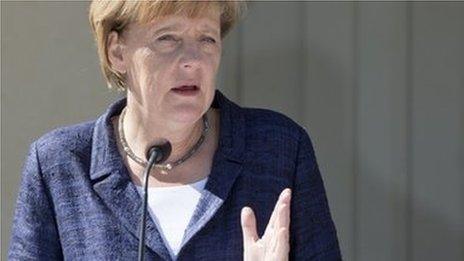Setback for Cameron as EU party blocs back Juncker
- Published
- comments
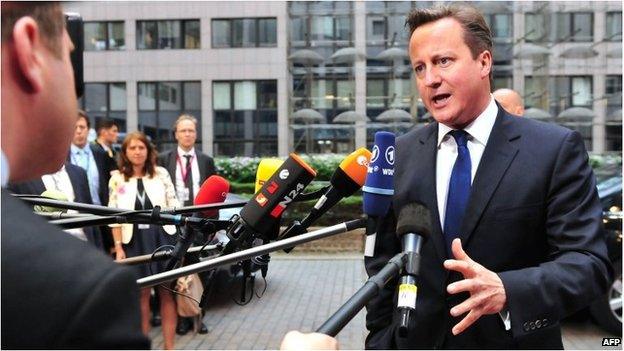
UK Prime Minister David Cameron has suffered a setback in his battle to prevent Jean-Claude Juncker getting the EU's top job.
Mr Cameron has made a direct appeal to voters in Ireland, France and Germany, external to back a candidate who will change the way Brussels is run.
He calls for "bold leadership" for the European Commission.
But the main centre-left and centre-right groups in the European Parliament have joined forces to back Mr Juncker.
Manfred Weber, head of the European People's Party, the main centre-right group, said: "There is growing support for Juncker at all levels".
He said choosing any other candidate would trigger "a constitutional crisis".
'No veto'
The EPP lost many seats at last month's European elections but remains the largest group in the Brussels parliament. So it argues that under new rules its candidate for the job - Mr Juncker - must be considered first.
Mr Weber said Britain was "only one country among 28 and there is no right of veto" on naming the next Commission president.
Mr Cameron argues that Mr Juncker represents an EU elite favouring "ever closer union" which is out of touch with many voters and resistant to radical reform of the EU.
How the maths will work out as MEPs bid to form cross-country alliances in the new-look Parliament
Hannes Swoboda, leader of the centre-left Socialists and Democrats (S&D) group, said: "We reiterate that Jean-Claude Juncker - as the candidate of the largest group in the European Parliament - must have the right to be the first to seek a majority in the European Parliament, through proposing an adequate work programme."
But David Cameron, who with Sweden and the Netherlands opposes Mr Juncker's candidacy, attacks the new rules in his newspaper article.
He says each of the main political groups ran "lead candidates" - so-called Spitzenkandidaten - during the elections and did "a back-room deal to join forces after the elections in support of the lead candidate of the party that won the most seats".
This, Mr Cameron said, is not a process discussed by European institutions nor ratified by national parliaments.
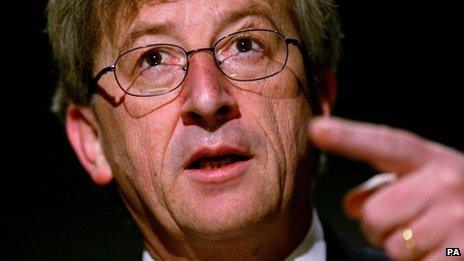
Jean-Claude Juncker has the backing of German leader Angela Merkel
Dispute over procedure
The prime minister insists that his concerns are "not an attack on Mr Juncker, an experienced European politician, to say this is nonsense".
"Most Europeans did not vote in the European Parliament elections. Turnout declined in the majority of member states. Nowhere was Mr Juncker on the ballot paper.
"Even in Germany, where the concept of 'Spitzenkandidaten' got the most airtime, only 15% of voters even knew he was a candidate. He did not visit some member states. Those who voted did so to choose their MEP not the Commission president.
"Mr Juncker did not stand anywhere and was not elected by anyone."
Mr Cameron said that under the EU treaties, it is for EU heads of government to propose the candidate to head the European Commission, and then for MEPs to vote on this candidate in a secret ballot.
However, the prime minister said, "certain MEPs have invented a new process whereby they are trying to both choose and elect the candidate".
Explaining the reasons why he wanted a more reform-minded candidate, Mr Cameron says: "The results of last month's European elections showed people were disillusioned with the way the EU was working.
"They are demanding change so it focuses on what they care about: growth and jobs. And they want the EU to help them, not dictate to them."
Tension over German party
This was clear, he wrote, through the rise of anti-EU parties, the fall in turnout in most countries and the decline in support for the European Parliament's largest political groups.
Mr Cameron also said Europeans must focus on finding the best candidate for Commission president.
The ideal candidate, he said, would be "someone who can deliver reform; driving growth and creating jobs; and accepting that Europe's needs may best be served by action at the national level".
He called for "an honest and trusted broker able to re-engage Europe's voters".
It comes as the group of MEPs founded by the Conservatives voted to admit Germany's Alternative fuer Deutschland (AfD) party - an anti-euro rival to Mrs Merkel's Christian Democrats.
BBC Europe correspondent Chris Morris said the vote by members of the European Conservatives and Reformists was a "setback" for Mr Cameron, which could put further strain on his relations with the German chancellor.
EU leaders hold a summit on 26 and 27 June, with the Commission job top of the agenda.
- Published10 June 2014
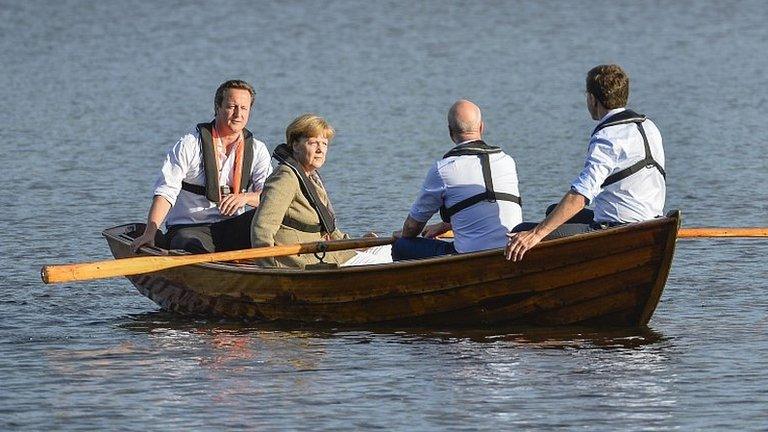
- Published24 June 2014
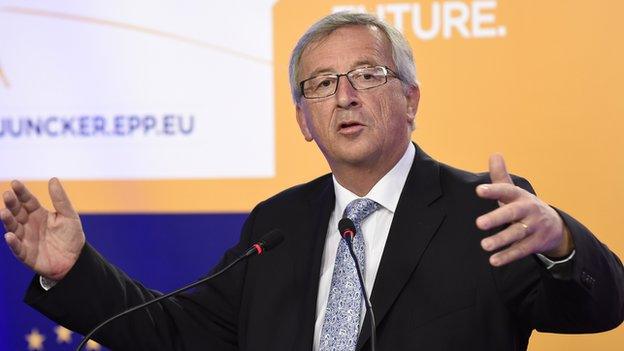
- Published10 June 2014
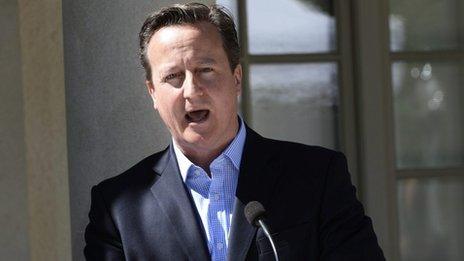
- Published10 June 2014
